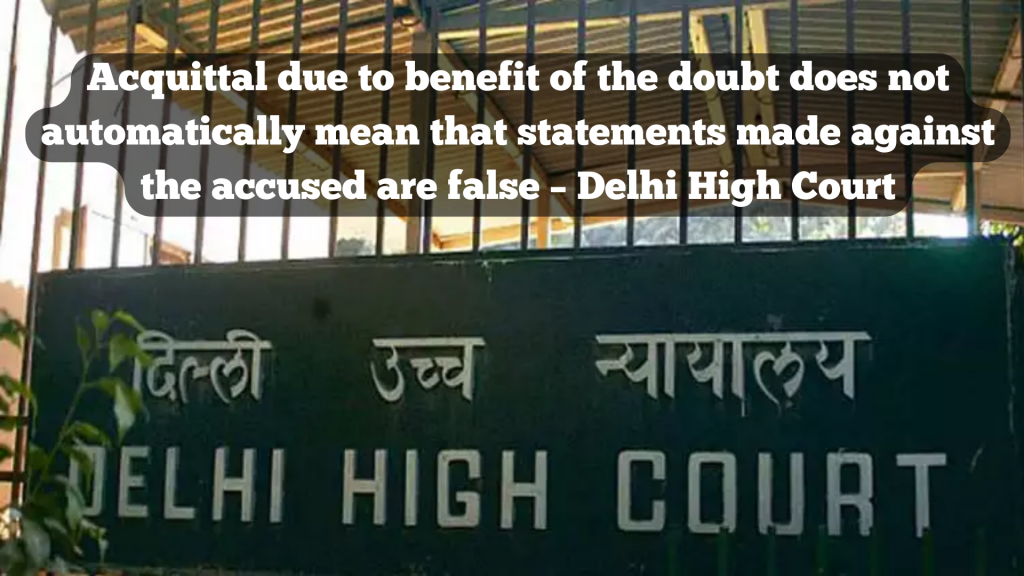
Acquittal due to benefit of doubt does not automatically mean that statements made against the accused are false – Delhi High Court
Judgement Given On : 19/09/2022
Introduction:
In the recent case of Sarvjeet Singh v. State (NCT of Delhi) and Another [W.P.(CRL.) NO. 1598/2022 & CRL. M.A. 13903/2022], the Delhi High Court grappled with the complex legal issues surrounding Section 340 of the Code of Criminal Procedure, 1973 (Cr.P.C.) and its interplay with the principles of justice and fairness. This case sheds light on the legal recourse available to individuals who believe they have been falsely implicated during legal proceedings and the delicate balance the courts must strike when considering such matters.
Background:
The petitioner, Sarvjeet Singh, found himself entangled in a legal battle when an FIR was lodged against him in 2015 under Sections 354A (sexual harassment) and 509 (insult to the modesty of a woman) of the Indian Penal Code, 1860. However, in 2019, the trial court acquitted him, citing a critical issue: the non-examination of eyewitnesses who could have supported the prosecution’s case.
Sarvjeet Singh’s legal saga did not end with his acquittal. He pursued legal action against ‘X,’ a former St. Stephen’s College student, alleging that ‘X’ had provided false testimony during the trial, ultimately leading to his false implication. To address this grievance, Sarvjeet Singh initiated proceedings under Section 340 Cr.P.C., seeking a criminal inquiry against ‘X’ for perjury and false charges.
Understanding Section 340 of the Cr.P.C.:
Section 340 Cr.P.C. is a provision designed to safeguard the integrity of legal proceedings and ensure that justice is served. It specifically deals with cases of perjury, fabrication of false evidence, and the making of false accusations before a court of law. The essence of this provision is to penalize those who undermine the sanctity of court proceedings.
The Contention of the Petitioner:
Sarvjeet Singh, the petitioner, approached the Delhi High Court to challenge the two orders passed by the trial court. These orders had dismissed his application under Section 340 Cr.P.C., effectively denying his request for a criminal inquiry against ‘X’ for allegedly providing false information, giving false evidence, and making false charges against him during the trial.
Key Legal Observations:
The trial court, while dismissing the application under Section 340 Cr.P.C. and Section 195 Cr.P.C., took a nuanced stance. It emphasized that Sarvjeet Singh’s acquittal on the grounds of reasonable doubt did not automatically imply that ‘X’ had deliberately provided false testimony to implicate him. This observation underscores the importance of establishing intent and malice when invoking Section 340 Cr.P.C.
The Appellate Court also made noteworthy observations, wherein it upheld the trial court’s order, highlighting that it was well-reasoned and devoid of any material irregularity or illegality. Importantly, the appellate court cautioned against interpreting Section 340 Cr.P.C. too liberally, as this could potentially lead to every acquittal triggering its provisions. This cautionary note underscores the need for courts to exercise discretion and prudence when applying Section 340 Cr.P.C.
Moreover, the court clarified that the mere loss of reputation is insufficient grounds to invoke Section 340 Cr.P.C. To trigger this provision, there must be a palpable and deliberate act of providing false information or evidence aimed at prejudicing the administration of justice.
Court’s Disposition:
Ultimately, the Delhi High Court found the petitioner’s case to be devoid of merit and dismissed the petition. However, the court did not leave Sarvjeet Singh without recourse. It granted him the liberty to initiate appropriate legal proceedings against ‘X’ for defamation, allowing him to seek redress for any harm caused to his reputation. This decision underscores the court’s commitment to ensuring that individuals who have suffered reputational damage have legal avenues for seeking justice.
Conclusion:
The Sarvjeet Singh v. State serves as a significant legal precedent, offering insights into the nuanced application of Section 340 of the Cr.P.C. It underscores that a mere acquittal is not sufficient grounds to invoke this provision; there must be a demonstrable intent to subvert the course of justice. Furthermore, it highlights the courts’ obligation to exercise caution when applying Section 340 Cr.P.C. to prevent its misuse.
In sum, while Sarvjeet Singh’s quest for justice through Section 340 Cr.P.C. did not yield the desired outcome, the legal system ensured that he was not left without recourse, permitting him to pursue defamation claims. This case exemplifies the legal system’s commitment to upholding fairness, justice, and the sanctity of legal proceedings in India.
